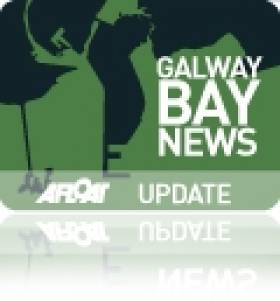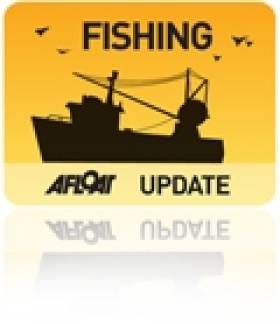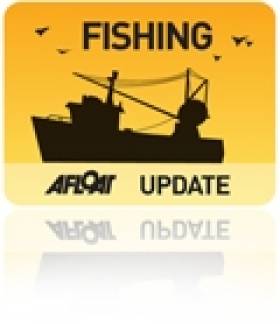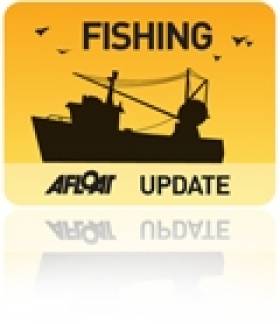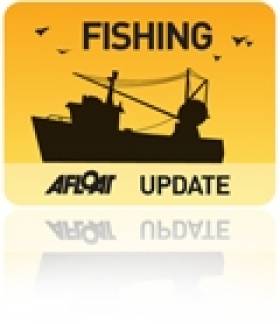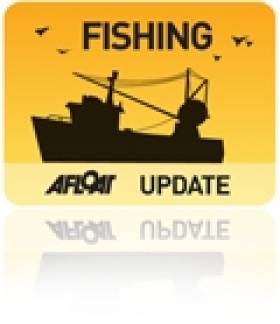Displaying items by tag: Simon Coveney
Groups Urge Fisheries Ministers For Action On CFP
#CFPreform - RTÉ News reports that up to 200 conservation groups in Ireland and abroad have written to Marine Minister Simon Coveney and his EU counterparts urging his support for an end to overfishing in European waters by 2015.
The groups claim that mismanagement of EU fisheries under the Common Fisheries Policy has resulted in significant overfishing, particularly in the Mediterranean where as much as 80% of fish stocks are fished far beyond sustainable levels.
As previously reported on Afloat.ie, Minister Coveney - who is President of the European Council of Fisheries Ministers - welcomed a vote in February on a reform agenda for the CFP, which has been prioritised for delivery by the Irish EU presidency before the six-month term concludes at the end of June.
#Marine - 'Foods of marine origin' are covered by the new call for research proposals under the Government's funding programmes, as announced by Marine Minister Simon Coveney on Tuesday.
In addition, the minister announced his intention to co-fund projects related to the marine sector with the Marine Institute.
Minister Coveney said that "co-funding arrangements between research funders, where appropriate, are logical in the context of the National Research Prioritisation process and, in this instance, it makes perfect sense for my department and the Marine Institute to come together to fund research relating to marine origin foods”.
The new call for research proposals, in general, aims to build and maintain research capability in the Irish public research system, which contributes to underpinning the sustainability and competitiveness of the Irish agri-food, forestry and fisheries sectors and the achievement of growth targets set out in the Food Harvest 2020 plan.
Apart from the marine food sector, areas covered by the call include animal and crop production, food and health, forestry, the wider bio-economy as well as the safety, quality, integrity and sustainability of the supply chain.
Minister Coveney added: “I have no doubt that the research community will take full advantage of this opportunity by submitting excellent proposals and I look forward to following the process over the coming months.”
The deadline for proposal applications is Tuesday 7 May at 1pm. All documentation in relation to the call for proposals is available on the Research Section of the Department of Agriculture, Food and Marine website.
#FishFarm - The Government 'will follow procedure to the letter' regarding the proposed €100-million deep sea fish farm for Galway Bay.
That was the message from Marine Minister Simon Coveney in the Dáil last week, as reported by Galway Bay FM, after it emerged that more than 400 submissions on plans for the State's largest ever aquaculture scheme were made to the his department.
The Dáil discussions came just days after a public protest against the fish farm plans in Galway - and some months after the National Inland Fisheries Forum lambasted as "flawed" the consent process regarding the proposed development.
Some 2,000 people amassed in opposition to the 500-hectare organic salmon farm off the Aran Islands proposed by Bord Iascaigh Mhara (BIM), which if it gets the go-ahead would be the largest facility of its type in Europe and would double the State's production rate of organic salmon - one of Ireland's most profitable export foodstuffs.
BIM has previously accused environmental campaigners of being "deliberately alarmist" about the fish farm, despite concerns raised my Inland Fisheries Ireland over the potential impact of sea lice infestations on wild salmon in the bay.
Meanwhile, in a letter to the Galway Advertiser last week, Attymon resident Gabe Cronolly criticises a BIM leaflet informing the public of its proposals.
"The leaflet states that sea lice can only be held responsible for one per cent of salmon losses at sea, but fail to report that 39 per cent of mortalities in fish farms are attributed to sea lice," he writes.
Minister for Marine Coveney Brokers New European Fishing Deal
#fishing – Minister for Agriculture, Food and Marine, Simon Coveney T.D following a long and tense set of negotiations brokered political agreement at today's Council of Fisheries Ministers for the introduction of a Europe wide discards ban.
The decision made by the Council of Ministers in Brussels is a very important decision for the future of European fisheries and is a clear expression of the will of the Council to consign to history the current discard practices in European fisheries. The decision is also important in that it will allow the Irish Presidency, on behalf of the Council, to engage directly with the European Parliament and Commission with a view to reaching political agreement on the reformed Common Fisheries Policy during the Irish Presidency.
Minister Coveney said "I have been a strong advocate for the elimination of the wasteful practice of discards over many years, to my mind today's decision by the Council of Ministers is a historic milestone in European Fisheries Policy"
Balancing divergent Member States views with the need to deliver practical and implementable measures to facilitate agreement on the early introduction of a discard ban in all the waters under the jurisdiction of the EU was always going to be a difficult challenge.Discarding is a highly complex issue and occurs in almost every fishery, in every area and across most fleets in the European Union. Every Member State operating fishing operations on the open sea has a discard problem. Many Member States have significant levels of discards in certain fisheries, and for varying reasons.
The Minister went on to say " The discarding issue was always going to be contentious and resolving it difficult ,not that there was any disagreement on the overall objective, but because there were divergent views on the associated management tools needed to make a discard ban a reality in practice"
In Brussels today, Minister Coveney secured agreement for an ambitious phased approach to introducing the discard ban. Starting in January 2014 for pelagic stocks moving onto the Baltic Sea in January 2015. The discard ban will apply to the main demersal stocks in the North Sea and the North and South Western waters from January 2016. Finally the discard ban will apply to fisheries in the Mediterranean, the Black Sea and all other Union waters on 1st January 2017.
On the details of the measure the Minister said "We have set an ambitious timeframe starting in January 2014, for introducing the discard ban underpinned by specific management tools to ensure its delivery."
Putting an end to discards is a key objective in the reform of the CFP supported by all Member States. A very important element in delivering on this objective will be the introduction across all fisheries of smarter and more selective fishing gear selectivity measures and changed fishing practices that avoid to the greatest extent unwanted catches particularly those of juvenile fish.
The Minister paid tribute to his Ministerial colleagues by adding "I have to thank my Ministerial colleagues for their co-operation, help and stamina in agreeing this very ambitious programme for change. I would also like to mention the contribution I have received from Commissioner Damanaki throughout the whole process"
The practical measures agreed today, will assist fishermen in the transition to the new environment. These measures provide transitional arrangements to support the change over to the new landing obligation. They also provide flexibility in terms of maximising quota options so that fisheries will not be closed unnecessarily The new EU fisheries fund will be available to support fishermen with the move to more selective and sustainable fishing practices.
Concluding the Minister added "It has been a long day and night, but a fruitful one. We can look forward to the completion of reform of the Common Fisheries Policy with confidence, in the knowledge that we have taken a major step to secure the long term sustainability of the stocks in European waters.
Coveney Seeks Agreement From EU Marine Ministers On Discards Ban
#Fishing - Minister for the Marine Simon Coveney will be seeking agreement from his European colleagues at next week’s Fisheries Council on how when and how introduce an effective discards ban in the context of the reform of the Common Fisheries Policy (CFP).
At the June 2012 Fisheries Council, ministers did not reach agreement on how a discard ban would be implemented or when such a ban would be introduced.
The challenge for Minister Coveney as president of the European Council of Fisheries Ministers is to secure wide agreement at council on an ambitious early date for the introduction of a ban in all waters across the EU from the Baltic & North Sea to the North Eastern Atlantic, the Mediteranean and the Black Sea.
Ministers will need to agree the practical measures that will ensure that the ban is capable of being effectively implemented in all these areas.
In a review of global discarding, the Food and Agriculture Organisation of the United Nations (FAO) noted that the North East Atlantic has the highest discard level in the world, estimated at 1.3 million tonnes, the majority attributed to EU fisheries. The EU Commission itself estimates that 23% of all fish caught by EU vessels are discarded.
Discarding occurs in almost every fishery, in every area and across most fleets in the European Union. Every member state operating fishing operations on the open sea has a discard problem. Many member states have significant levels of discards in certain fisheries, and for varying reasons.
The policy to stop discarding of fish and to change behaviour of fishermen so that unwanted by-catches and juvenile fish are no longer caught must be seen as an integral part of fisheries management in general and serve the overarching goals of moving to long-term management based on ecosystem considerations and reaching maximum sustainable yield by 2015, where possible, and by 2020 at the latest for all stocks.
The three European institutions, all member states and importantly the Irish presidency are fully supportive and committed to the introduction of a discard ban.
A very important element of delivering the overall objective will be the introduction across all fisheries of smarter and more selective fishing gear, strengthened selectivity measures and changed fishing practices that avoid to the greatest extent possible unwanted catches particularly those of juvenile fish.
To assist the debate on discards and facilitate actions to resolve the problem, Ireland published a 'Discards Atlas' detailing the full extent of discards by the Irish whitefish fleet. It is critically important that other member states do likewise to support the introduction of the new policy and inform measures that will be needed to ensure that a new policy is fully implemented by EU fishing fleets.
Minister Coveney commented: "I am and continue to be a strong advocate for a policy which eliminates the wasteful practice of discards.”
On the prospects for council, he said: “I am under no illusion of the challenges the effective implementation of a discards policy pose for European fishermen and for the member states of the EU, and will work intensively with my European ministerial colleagues over the course of the February Council to deliver a policy with an ambitious timetable for implementation that will end the discarding of fish and support the rebuilding of fish stocks and the future of coastal communities depending on fishing.
"It is my firm belief that the success or failure of the reformed CFP will be judged to a large extent on the effectiveness of whatever discard ban is introduced and that there is widespread support for the ban from the fishing nations of the EU and their fishermen.
"It is imperative that European fisheries ministers collectively take this progressive but challenging decision now and co-operate in agreeing appropriate and effective measures to eliminate discards with ambitious timelines."
Agreement in the council will free up the Irish presidency, on behalf of the council, to begin negotiations with the European Parliament and Commission to reach political agreement on a new reformed Common Fisheries Policy by June.
Marine Minister Opens Major Bioeconomy Stakeholders Conference
#Bioeconomy - Minister for the Marine Simon Coveney today (14 February) opened a major Stakeholder Conference on the Bioeconomy in Dublin Castle.
The conference - titled 'Bioeconomy in the EU: Achievements and Directions for the Future' - was jointly organised by the EU Commission and the Department of Agriculture, Food and the Marine on behalf of the Irish Presidency of the European Union.
Commissioner Máire Geoghegan-Quinn also addressed the delegates at the opening of the conference, which brings together all the major stakeholders in the bioeconomy from Ireland, across Europe and beyond, including researchers, educationalists, policymakers, industry representatives and civil society.
The purpose of the conference is to take stock of progress on implementing the EU Bioeconomy Strategy, which was launched 12 months ago by Commissioner Geoghegan-Quinn, and to promote informed public debate on the future development of the bioeconomy.
Setting the broad context, Minister Coveney said the “grand societal challenges of the 21st century place enormous pressures on all of us to change the way we do things at a member state, European, and indeed global level. Our objective is clear... we need a more innovative and low emissions economy, reconciling demands for sustainable agriculture and fisheries, food security and the sustainable use of renewable resources for industrial processes, while protecting the environment.”
The minister added that in Ireland’s case “the Government’s Policy Statement, 'Delivering our Green Potential', adopted last year, commits us to developing a Bioeconomy Strategy as part of a broader strategy on the Green Economy. This work will be progressed over the coming months overseen by the Cabinet Committee on Climate Change and the Green Economy."
Referring to the fact that the marine sector, along with agri-food and forestry, helps form the backbone of the bioeconomy in Ireland, the minister recalled the Think Green, Act Smart, Achieve Growth philosophy of Food Harvest 2020 and went on to say that “by applying these principles along the entire bioeconomy value chain, we can exploit the full potential of our rich natural resources in a sustainable manner for our own economic advantage while also contributing to meeting the increasing global demand for food.”
Minister Coveney pointed out that Ireland is making steady progress in implementing the various actions foreseen across the three pillars of the EU Bioeconomy Strategy.
“My colleagues in Government and I remain fully supportive of research and innovation and understand the crucial role it plays in underpinning growth in the bioeconomy,” he said, adding that he was “delighted to report that several of the areas prioritised for future Exchequer funding under the National Research Prioritisation Exercise related to the bioeconomy, including 'Sustainable Food Production & Processing' and 'Manufacturing Competitiveness'."
Commissioner Geoghegan-Quinn stressed that "the bioeconomy's employment potential can certainly kick-start economies and reinvigorate communities in some of our most peripheral and deprived areas".
She added that "an economy based on biological resources is also the newest economy... it is a crucible of new technology and innovation, leading the way in the application of information technology, biotechnology and the life sciences while in many cases blending these with existing knowledge and expertise" and that “it is in the member states and regions that the greatest work must be done.”
Marine Minister Welcomes Vote on Common Fisheries Policy Reform
#CFPReform - Minister for the Marine Simon Coveney, in his capacity as President of the European Council of Fisheries Ministers, last week welcomed the vote by the European Parliament on the reform agenda for the Common Fisheries Policy (CFP) which has been prioritised for delivery by the Irish EU presidency.
The vote, which is seen a major step forward in the CFP reform process, follows the minister’s address to parliament on Tuesday last. At the address the minister appealed for all parties to work together towards an agreed CFP reform package to be delivered during the period of Ireland’s presidency.
These reforms, which prioritise long term sustainability of fishing stocks, elimination of the controversial practice of discards (dumping at sea) and a switch to long-term (scientifically based) planning for fisheries, were approved by the parliament on Wednesday 6 February.
The decision of the parliament follows the minister’s address last Tuesday during which he identified the reforms as a major priority on the Irish Government’s EU presidency agenda.
Minister Coveney stated: “I am delighted that the parliament has today decided to back these necessary and timely reforms to the Common Fisheries Policy and that the case for reform outlined in my recent address has been accepted in an agreed manner.
"I am particularly encouraged that this vote has occurred during the Irish EU Presidency. This shows the pivotal role which Ireland can play in influencing broader European Policy and in bringing together divergent views towards an agreed reform package for the CFP.
"Ireland has set out an ambitious work programme aimed at delivering an agreed reform package for the CFP by the end of June. This objective can only be realised if [European] Parliament, Council and the Commission work together focusing on the bigger picture of an agreed reform agenda to benefit all of Europe’s citizens.”
During his address to the plenary session of European parliamentarians, Minister Coveney expressed his view that a momentum was now gathering behind the drive to deliver an agreed reformed CFP package by the end of June.
Acknowledging to the parliament that he had set out an ambitious work programme for his presidency, the minister accepted that differences remain between the European Council and Parliament, particularly on the question of multi-annual fisheries plans.
Minister Coveney emphasised the significant areas of common ground between both institutions and his belief that this would eventually lead to an agreed way forward on most aspects of the reform package. He stressed that it was only in a framework of mutual cooperation and flexibility that the objective of a reformed CFP which prioritises long term fisheries sustainability could be delivered in the lifetime of the current Irish Presidency.
The minister acknowledged the challenges ahead and emphasised the importance for the EU Parliament, Council and Commission to work together on all the issues including delivering on maximum sustainable yield, the elimination of discards and regionalisation.
Following an exchange of views, the minister sought support for his objective of achieving political agreement by the end of June in addition to acceptance of the need for a different and more effective way of working to deliver on what is a commonly held objective. He committed to working constructively with the parliament on all outstanding issues.
Important Fisheries Talks Continue in Brussels
#Fishing - Important talks on EU fisheries reform are continuing in Brussels after progress in Clonakilty recently, according to RTÉ News.
As previously reported on Afloat.ie, Marine Minister Simon Coveney welcomed a deal signed on Friday 18 January between the EU and Norway on allowable catches and quotas.
The agreement was seen as a positive move at the end of a week of talks at the National Seafood Centre, which followed a number of false starts due to difficulties in balancing mutual access and management arrangements.
Minister Coveney said that meetings taking place in Brussels today (28 January) are "about setting the scene for six months of intensive work" to produce dossiers for both the Common Fisheries Policy and the Common Agricultural Policy, for which he hopes definitive reforms can be achieved by this summer.
Both the CFP and CAP account for 40% of the European Union budget.
Irish Fisheries Deal Criticised By Stakeholders
#Fishing - The EU fisheries deal secured by Marine Minister Simon Coveney in Brussels yesterday has been variously described as "horrendous" and "a mixed bag" by Irish fishing industry stakeholders, as The Irish Times reports.
Yesterday Minister Coveney said he was pleased to secure "a good deal for Irish fishermen" after difficult negotiations, one "that will support our fishing industry over the coming year and which is sustainable in terms of the fish stocks on which we are dependant".
A total in excess of 216,000 tonnes of fish quotas is available to Irish fishermen in 2013 under the deal, split between more than 35,500 tonnes of whitefish and 180,000 tonnes of pelagic fish such as herring and mackerel.
But Ebbie Sheehan, chair of the Irish Fishermen's Organisation, described the deal as "horrendous" - singling out cuts to Ireland's haddock and monkfish quotas, species of which he said "there is an absolute abundance".
Meanwhile, Federation of Irish Fisherman chair Eibhlin O'Sullivan, while welcoming the increased quotas for prawns and blue whiting, claimed the agreement was "a mixed bag" for Ireland, noting that the cut in the haddock quota runs contrary to moves to bring and end to fish discards - a process the minister committed to supporting earlier this year.
The Irish Times has more on the story HERE.
EU Votes For Changes To Common Fisheries Policy
#FISHING - Minister for the Marine Simon Coveney has welcomed today's vote in the European Parliament to make amendments to the Common Fisheries Policy (CFP), as RTÉ News reports.
The vote comes just weeks before Ireland assumes its six-month EU Presidency term in January - and has been described by MEP Pat 'the Cope' Gallagher as significant step towards tacking the problem of discards in a practical manner.
Earlier this year Europe's fisheries ministers hailed a "breakthrough" deal on ending the practice of discards, whereby countless numbers of fish are thrown back into the sea under the quota system implemented by the CFP.
However, environmental groups criticised the timeline for implementation of the discards ban, as well as the "vague" wording of the proposed limits on fishermen.
Meanwhile, Minister Coveney was last month accused of "hypocrisy" by environmental groups for his support of fishing fleet subsidies that they argue would be used by bigger fishing countries like France and Spain to exploit dwindling stocks in Irish waters.
Markus Knigge, a consultant with environmental lobby group Ocean 2012, said Minister Coveney's position on the matter was a U-turn on his previous commitment to end the practice of discarding fish at sea.
The EU Fisheries Council, which runs from today till Thursday 20 December, will among other issues see quotas for the Irish fishing fleet decided for 2013.
Ireland is facing severe double-digit cuts in almost 30 different fish stocks considered vital to the Irish fishing industry.
The minister has described the negotiations as the "most difficult" in years.




























